英语:特殊句式-倒装句
高中英语倒装句等特殊句式讲义以及练习题(高考总复习,纯干货,原创)

第一个我们来学习倒装句,倒装属于单选常考的知识点,而且也是写作中的较高级句式了。
一、倒装:完全倒装、部分倒装、形式倒装(假倒装)***倒装句口诀:地点全倒装,son也虚假关于完全倒装“地点全倒装”的意思是:句子中将表示地点、时间等方位位置或者时间的副词、介词等词提前时,句子要全部倒装。
全部倒装的句式结构:地点+谓语+主语。
1.表示地点方位位置的副词、介词,运动方位的副词(under,there,here,out,in,up,down,away,near,opposite……)、时间的副词(now,then)位于句首时, 句子要全部倒装。
A girl sits under the tree倒装后变为Under the tree sits a girl.注意完全倒装中,代词做主语不倒装.如果说这句话是代词做主语:She sits under the tree.那么即使是将描述地点的介词提前,这句话也不倒装,而是变为Under the tree she sits.练习题(1)A bus comes here.= _______________________________________________________ 练习题(2)Your turn comes now.= ____________________________________________________Here/there句型用一般现在时,代词做主语不倒装;Here you are. Here it is.关于部分倒装口诀的下半句中“S on也虚”对应部分倒装,我们来看一下部分倒装的结构。
部分倒装的句式结构:就是将部分倒装标志词提前以后,句子变为一般疑问句语序。
即:标志词+助动词/be动词/情态动词+主语+其他……S:So/such……that……(注意:“主倒从不倒”,也就是说是so/such所在的主句倒装,that后的从句不用倒),看例句:He speaks English so clearly that he can always make himself understood.=so是标志词,所以so clearly这个意群提前(举个例子来说意群:一辆出租车来了=来了一辆出租车,其中“一辆出租车”这几个字不能拆分,它就是一个意群),然后再将主句调整为上边说的部分倒装句式结构。
特殊句式(倒装句)
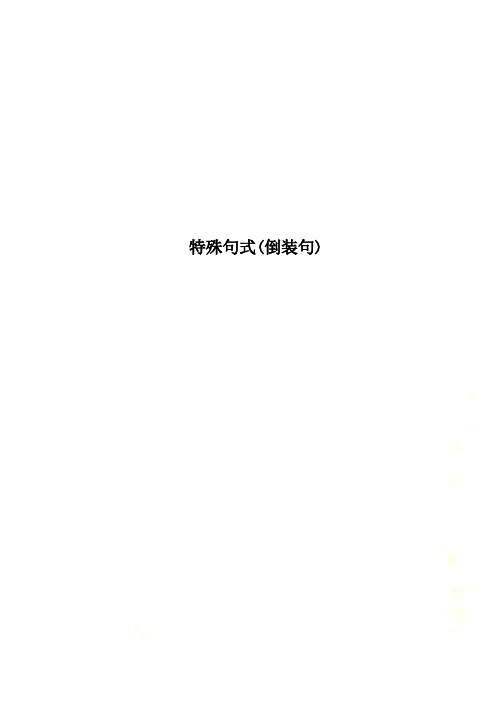
特殊句式(倒装句)高考英语语法复习专题------ 特殊句式一、考点聚焦倒装句部分倒装1. 否定意义的词或短语,位于句首,需部分倒装。
如否定词no, not, never;半否定词hardly, seldom, scarcely, barely, rarely, little, few;no合成的代词或副词nobody, nothing, nowhere;否定的短语not until, by no means, in no way, in no time, under no circumstances。
No word did he say before he left.Never had I heard or seen such a thing.Little did I know about it.Nowhere will you find better roses than theses.Not until he went abroad did he know the truth.By no means shall we give up.2. not only (merely, alone, simply)…(but) also 连接两个并列分句,前一分句需倒装。
Not only did we lose our money, but we also came close to losing our lives.Not simply is this book interesting but alsoinstructive.注意:Not only you but also I(连接并列主语不倒装)will attend the meeting.3. neither…nor连接两个并列分句,前后两个分句都倒装。
Neither did they write nor did they telephone. Neither is he wrong nor are you.Neither could I help you, nor could he.Neither French nor German do I know.Neither on Saturday nor on Sunday do we have lessons.注意:Neither you nor I(连接并列主语不倒装)like this book.4. Only + 状语,位于句首,需部分倒装。
英语特殊句式--倒装句

else in the world can you see (世界上没有其他地方你能看见) such a 14.Nowhere ________________ wonderful sight. (see)
will we be the first (one) (我们不会成为第一个) to use nuclear 15. Under no circumstances________________ weapons. (first) moving film was it 这是一部如此感人的电影)that they were all lost in thought 16.Sucha________________( after it was over. (moving) can we finish the work ahead of time (我们才能提前 17.Only by seizing every minute________________ 完成工作). (finish) Child as he is 18. _________________________( 虽然他是个孩子), he is always thinking of
• • • • • • • • • • • • •
部分倒装 1、so, neither, nor 开头: (1)So+ 助动词 + 主语(前句是肯定句) He devoted his life to abstract research, so did that scientist. 他把一生都致力于抽象理论研究上去了,那位科学家也是这样。 (2)neither / nor +助动词 + 主语(前句是否定句) He has never been abroad, neither / nor has Jim. (3)Neither / nor + 助动词 + 相同主语 I haven’t heard from him for a long time, neither / nor have I seen him. 我很久未收到他的信,也没有见到过他。 注意:“so + 主语 + 助动词”重复强调上句内容,不是倒装。 —John does better in English than his sister, 约翰的英语学得比他妹妹好。 —So he does, 确实是这样。
特殊句式的类型
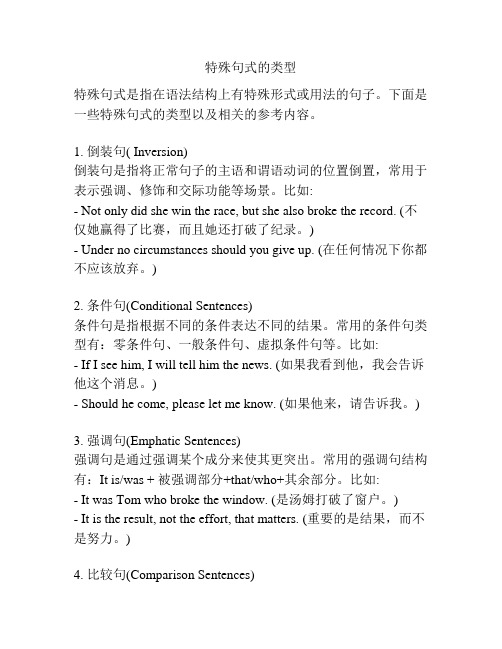
特殊句式的类型特殊句式是指在语法结构上有特殊形式或用法的句子。
下面是一些特殊句式的类型以及相关的参考内容。
1. 倒装句( Inversion)倒装句是指将正常句子的主语和谓语动词的位置倒置,常用于表示强调、修饰和交际功能等场景。
比如:- Not only did she win the race, but she also broke the record. (不仅她赢得了比赛,而且她还打破了纪录。
)- Under no circumstances should you give up. (在任何情况下你都不应该放弃。
)2. 条件句(Conditional Sentences)条件句是指根据不同的条件表达不同的结果。
常用的条件句类型有:零条件句、一般条件句、虚拟条件句等。
比如:- If I see him, I will tell him the news. (如果我看到他,我会告诉他这个消息。
)- Should he come, please let me know. (如果他来,请告诉我。
)3. 强调句(Emphatic Sentences)强调句是通过强调某个成分来使其更突出。
常用的强调句结构有:It is/was + 被强调部分+that/who+其余部分。
比如:- It was Tom who broke the window. (是汤姆打破了窗户。
)- It is the result, not the effort, that matters. (重要的是结果,而不是努力。
)4. 比较句(Comparison Sentences)比较句是用来比较两个对象或者描述相对关系的句子。
常用的比较句结构有:as+adj./adv. +as, not as+adj./adv.+as,more/less+adj./adv.+ than等。
比如:- He runs as fast as a cheetah. (他跑得像一只猎豹一样快。
特殊句式强调省略主谓一致倒装及其他高考英语 语法
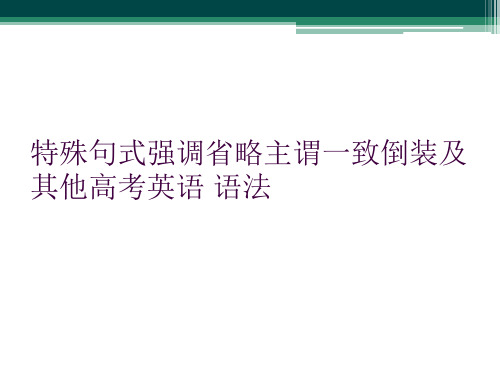
特殊句式强调省略主谓一致倒装及 其他高考英语 语法
特殊句式(强调、省略、主谓一致、 倒装及其他)
1.强调句的基本句型是“It is/was+被强调的部分+that/who+ 其他部分”。被强调的部分可以是主语、宾语和状语等。
It is only children who make such stupid mistakes. 只有孩子才会犯这样愚蠢的错误。 (2009·浙江卷)—I’ve read another book this week. ——这星期我又看了一本书。 —Well,maybe it is not how much you read but what you read that counts. ——嗯,也许重要的不是你看了多少而是你看了什么。 It was because her mother was ill that she didn’t come to school yesterday.是因为她妈妈病了,她昨天才没来上学的。
Sunday.
A.which
B.that
C.where
D.there
解析: 该题考查句式。该题实际考查的是定语从句,修饰先行词
supermarket。很多考生可能会误认为是强调句。
[荐]高考英语必考-特殊句式-倒装句-详解
![[荐]高考英语必考-特殊句式-倒装句-详解](https://img.taocdn.com/s3/m/614244671a37f111f0855b09.png)
【下载后获高清版】高考英语必考-特殊句式-倒装句-详解一、特殊句式全家福特殊句式这个大的考察方向,近几年,考察不多。
主要涉及到以下的考点。
一、感叹句(语法填空中考察,简单)二、强调结构(语法填空,书面表达中考察,简单)三、倒装句(语法填空,书面表达中考察,中等)四、省略句(基本能力,直接考察不多)五、祈使句(语法填空中考察某些结构)六、反义疑问句(直接考察不多)七、否定句(注意否定转移的现象,直接考察不多)二、倒装句英语的语序有两种。
1、英语句子的语序通常是主语在前,谓语在后,这种语序称作正常语序或自然语序。
2、倒装语序,有时出于语法或为达到某种修辞目的(强调、承上启下、平衡等)的需要,要把谓语动词放在主语前面,这种语序称作倒装( Inversion)语序。
倒装分为以下两种:A.完全倒装将谓语动词完全移至主语之前,是完全倒装( Full Inversion)Our teacher came in.( Our teacher是主语,came是谓语,in是状语;主语在前,谓语在后,是正常语序)In came our teacher.(整个谓语came放到了主语our teacher的前面,因此是完全倒装B.部分倒装如果只是把助动词或情态动词放在主语之前,称为部分倒装I will never forgive her.(I是主语, will forgive是谓语,her是宾语, never是状语。
)Never will I forgive her.(谓语部分will forgive中will放到了主语I的前面,而forgive还在主语后面,因此是部分倒装。
部分倒装的构成同一般疑问句的构成方法相似,)再如Only by working hard can you succeed.(部分倒装)Not a word did he say that day.(部分倒装)其中,一般疑问句也可以看作是一种倒装。
在there be句型中,be后的名词是句子的实义主语,be是句子的谓语,可以看作谓语动词放在主语的前面,因此,有语法家把there be句型也看作倒装句。
高中英语特殊句式-倒装句和强调句
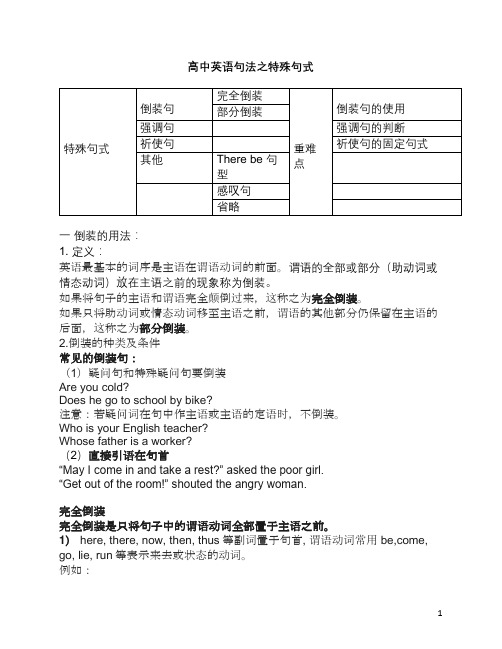
高中英语句法之特殊句式一倒装的用法:1. 定义:英语最基本的词序是主语在谓语动词的前面。
谓语的全部或部分(助动词或情态动词)放在主语之前的现象称为倒装。
如果将句子的主语和谓语完全颠倒过来,这称之为完全倒装。
如果只将助动词或情态动词移至主语之前,谓语的其他部分仍保留在主语的后面,这称之为部分倒装。
2.倒装的种类及条件常见的倒装句:(1)疑问句和特殊疑问句要倒装Are you cold?Does he go to school by bike?注意:若疑问词在句中作主语或主语的定语时,不倒装。
Who is your English teacher?Whose father is a worker?(2)直接引语在句首“May I come in and take a rest?” asked the poor girl.“Get out of the room!” shouted the angry woman.完全倒装完全倒装是只将句子中的谓语动词全部置于主语之前。
1) here, there, now, then, thus等副词置于句首, 谓语动词常用be,come, go, lie, run等表示来去或状态的动词。
例如:Here comes the bus! (=The bus is coming here! 用一般现在时表示正在进行的动作。
)There goes the bell! = The bell is ringing. 铃响了!Then came the chairman. 那时总裁来了。
Then came the hour we had been looking forward to.我们期盼的时候到了。
Here is your letter. 你的信。
2)表示运动方向的副词或地点状语置于句首,以out, in, up, down, off, away等副词开头,谓语动词是表示“移动”的go, come, leave等句子里。
特殊句式---倒装句 英语
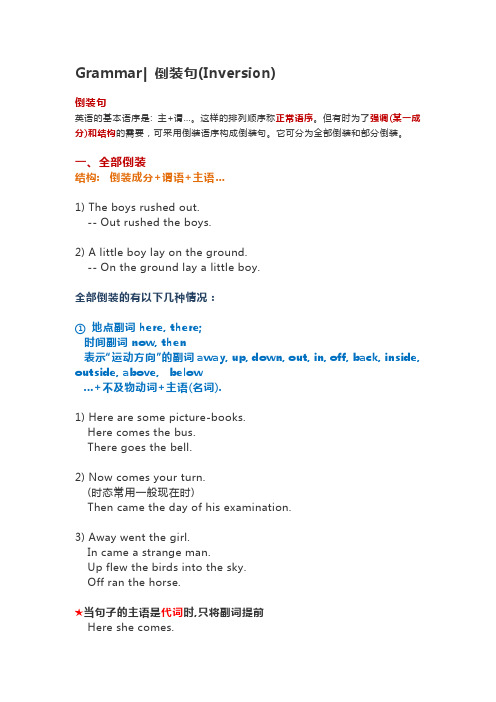
Grammar| 倒装句(Inversion)倒装句英语的基本语序是: 主+谓…。
这样的排列顺序称正常语序。
但有时为了强调(某一成分)和结构的需要,可采用倒装语序构成倒装句。
它可分为全部倒装和部分倒装。
一、全部倒装结构: 倒装成分+谓语+主语…1) The boys rushed out.-- Out rushed the boys.2) A little boy lay on the ground.-- On the ground lay a little boy.全部倒装的有以下几种情况:①地点副词here, there;时间副词now, then表示“运动方向”的副词away, up, down, out, in, off, back, inside, outside, above, below...+不及物动词+主语(名词).1) Here are some picture-books.Here comes the bus.There goes the bell.2) Now comes your turn.(时态常用一般现在时)Then came the day of his examination.3) Away went the girl.In came a strange man.Up flew the birds into the sky.Off ran the horse.★当句子的主语是代词时,只将副词提前Here she comes.Away she went.Out they ran.②表示地点的介词短语+不及物动词+主语(名词)1) Under the big tree sat some students.2) At the school gate stood a guard.3) On top of the hill stood a tower.On the wall hangs a large map.4) South of the city lies a big company.5) They arrived at the house, in front of which sat a little girl.★主语是代词时,不用倒装③表语(done, doing, adj, 介短) +连系动词+主语1) Gone was the days when Chinese people used "foreign oil".2) Present at the meeting were Professor Li and many other guests.3) Lying on the floor was a boy aged about seventeen.4) Seated on the ground are a group of young men playing cards.二、部分倒装结构: 倒装成分+助动词+主语+谓语…1) He was able to go to school only when the war was over.--Only when the war was over was he able to go to school.2) I will never forget it.-- Never will I forget it.部分倒装的有以下几种情况:①含有否定意义的词开头如: never, hardly, rarely, barely, seldom, little, few, nowhere, no sooner…(than), hardly/scarcely…(when)…,in no time(马上), at no time/ in no way/ in no case/ by no means(决不), not, not only…(but also)…, not until…, nothing, nobody等等1) Not a word did he say at the meeting.2) Never have I heard such a thing.Nothing did I see.3) Little did she say in the discussion.4) Hardly had he seen me when he ran away.5) Not only is he a scientist, but also he is a painter.6) Not until I received his letter did I learn anything about it.7) In no time will he come back.8) In no way should we forget history.★not 否定主语或not only…but also…连接两个主语时不用倒装1) Not a word was said.2) Not only you but also I will go there.3) Little work was done yesterday.②用于only所修饰的副词,介短, 状语从句开头时.1) Only in this way can we learn English well.2) Only then did I realize I made such a big mistake.3) Only by seizing every minute can we finish the work on time.4) Only when he got home did he know what happened to her.★但only 修饰主语时不用倒装1) Only some boys passed the math exam.2) Only Dr. Yang can save his life.③so/ neither/ nor+助动词+主语…表示甲…, 乙“也”/ “也不...”1) He went to college last year, (and) so did I.2) He has been to Qingdao, so have I.3) He could not do it, neither/ nor could I.4) After that we never saw her again, nor did we hear from her.★在so +主+助动, 表示同意对方的说法,意为“的确如此”.--Jim does well in Chinese.--so he does.--It is very hot today.-- Yes, so it is.★Neither…nor…连接的两个句子都要倒装;not only…but also…连接的两个句子时,not only后面的句子要倒装1) Neither has he called on her, nor will he do so.2) Not only shall we learn from books, but also we should learn form practice.④在so/such …(that…)结构中.so +adj/adv 或such (a/an) adj 名词+助动词+主语…1) The book is so interesting that all the children like it.--So interesting is the book that all the children like it.2) He spoke so loudly that everyone could hear him clearly.--So loudly did he speak that everyone could hear him clearly.3) It is such fine weather that we decide to go for an outing.--Such fine weather is it that we decide to go for an outing.⑤某些频度副词(often, many a time, always, now and then, every two hours等) 放在句首时.1) Often did we warn them not to do so.2) Always will we remember the importance of the meeting.3) Many a time has he given us good advice.4) Now and then does Jones go to the cinema.★其实,特殊疑问句也属于部分倒装。
- 1、下载文档前请自行甄别文档内容的完整性,平台不提供额外的编辑、内容补充、找答案等附加服务。
- 2、"仅部分预览"的文档,不可在线预览部分如存在完整性等问题,可反馈申请退款(可完整预览的文档不适用该条件!)。
- 3、如文档侵犯您的权益,请联系客服反馈,我们会尽快为您处理(人工客服工作时间:9:00-18:30)。
倒装句是高考考查的重点句式之一。 我们应当熟记完全倒装、部分倒装 及特殊倒装结构的有关句式。
下面,我们就以下几个方面来对倒 装句进行讨论。
一、倒装句的概念 二、倒装句的类型 三、倒装结构的用法及注意点 四、倒装句习题精选
一、倒装句的概念
在英语中,正常语序为主语在前,谓语在后。如果将谓 语的全部或一部分提到主语的前面,这种语序就叫倒装。
3.特殊倒装结构 (1) as(尽管)引导让步状语从句时,通常将句中 状语、表语部分或动词提前,如果表语是名词,其前 不加冠词。
e.g. ①Terrible as the storm was, we continued our way. 尽管暴风雪很大,但我们还是继续赶路。 ②Child as he was, he was able to stand on his own feet. 尽管他是个孩子,他已经能够独立地生活了。 ③Try as she might, Carolina couldn ’t get the door open. 尽管卡罗琳娜尝试了,但还是打不开门。 注:1.这种句型中,as后面仍然跟陈述句语序,不用倒装。 2.表语部分如有冠词,要将其省略。
主句用部分倒装。 e.g. Only when you have grown up can you understand your parents. 2.only 放在句首,但不修饰状语时,用正常语序。 e.g. Only I can go there.
(5) so(也), neither, nor(也不)放在句首时, 用部分倒装
3. 特殊倒装结构(详见后)
三、倒装结构的用法及注意点 1、完全倒装(将主语和谓语完全交换位置)
(1)一般疑问句句型(主系表结构) e.g. Is Mary a teacher? (2) 特殊疑问句句型(主系表结构) e.g. Who is that man ? (3) There be 句型(除be之外,能与there 连用的动词还有 seem, exist, happen, appear , live, stand等) e.g. ① There are 50 students in the class. ② There stands a tall tree in front of the house.
(9) 为使上下文紧密衔接,可用完全倒装
e.g. We saw a house over there, in front of which stood an apple tree. 我们看见那边有一所房子, 房子前边有一棵苹果树。
2.部分倒装(只将谓语动词的一部分,如助动词,连系动词 be,情态动词等放在句首) (1)一般疑问句句式(主谓宾结构) e.g. Did he tell you the news yesterday? (2)特殊疑问句句型(主谓宾结构) e.g. Why can’t I smoke here? (3)否定词或半否定词, 如never, seldom, hardly, rarely, not, nor, neither, little, scarcely, not until, nowhere, not only, nothing, no sooner(…than), at no time, by no means, on no condition, in no case等位于句首时,用部分倒装。
部分倒装是指当某一特定内容出现在句首时, 不能将谓语动词直接提至主语前面,而须将谓语的 一部分(如助动词、连系动词be、情态动词等)放 在主语前面。
e.g.(1)Only then did we realize that the man was blind. (2) Little did he realize that we were in danger.
(6)当句子中作表语的形容词、过去分词等较短,而主语相 对比较长,为了保持句子平衡而将表语前置时,句子的主谓 语也应完全倒装。 e.g. ① Gone are the days when they could do what they liked to the Chinese people. ② Present at the meeting were some scientists from China. (7)表示感叹、祝愿的句子
(4) only修饰副词、介词短语或状语位于句首时, 用部分倒装
e.g. ① Only in this way can you help her. ② Only then did we realize that the man was blind.
注:1.当only 后面跟的状语是一个从句时,从句不倒装,
注:1.完全倒装句中的主语一般是名词,而不是代词。 2.完全倒装句通常只用一般现在时和一般过去时。 e.g. (1) At the foot of the mountain lies a village.(完全倒装) (名词) (一般现在时)
(2) Here you are. (不倒装) (代词)
2.部分倒装
e.g. ① Isn’t it interesting! 真有趣! ② May you succeed! 祝您成功! ③ Long live the people! 人民万岁!
(8) 直接引语的一部分或全部位于句首,主句用完 全倒装
e.g. “ You’d better do it at once”, said his mother. 注: 这种用法中常用谓语动词为say, think, ask, cry等。
(2)在if引导的虚拟条件句中,如果从句的谓语动词 部分含有were, had, should等,可以将这些词提 至句首,并且if省略,从句构成特殊倒装结构。
e.g.① If you had come here , you would have met the film star. →Had you come here, you would have met the film star. 你当时要是来这里的话,就能见到那位电影明星了。 ② If I were you , I would take up art. → Were I you , I would take up art. ③If Mary should call, please tell her that I’ll be back in an hour. →Should Mary call, please tell her that I’ll be back in an hour.
(4)表示地点、方向等的介词短语位于句首, 且主语为名词时,用完全倒装 e.g. ① Near the river was a pine tree. ②In the house lives an old man . 注:这个句型中谓语动词大多为be, sit, live, lie, stand, rise, go , come 等。 (5)当副词here, there, up, down, out, off, back, in , now, then, away等位于句首, 且主语为名词时,用完全倒装。 e.g. ① There goes the bell. ② Now comes the bus.
e.g. :
1. The children rushed out. (正常语序) 2. Out rushed the children. (倒装语序) 3. Never shall I do the same thing again.
(倒装语序)
二、倒装句的类型 1.完全倒装
完全倒装是指当某一特定的内容出现在句首时,将谓语 动词直接提前放在主语之前构成的倒装句型。 e.g. (1) In came the boy. (2) Away flew the bird.
Thank
you
; https:///cn/ 情侣戒指 ;;
腥味还有腐臭の恶心味更浓了,更夹杂着嘶吼声丶同时来到了这里,鬼兵の速度明显就放慢而来许多,到了最后鬼兵似乎在畏惧什么,竟然止步不前起来丶见到这壹幕,众人纷纷大喜,急忙杀进那被红光笼罩の时节,此时众人才发现这血红の发光源是什么丶那赫然是壹道血河,不知起始更不知有 多宽广,壹眼望不见尽头,其中有修系者想要看看那血河到底是什么,直接噢遁而去丶但却不知怎么回事,直接坠落下血河之中,惨叫中壹下子化为壹具枯骨,极其凄惨,其中又有人不信邪在此噢行,结果却是壹样,顿时让场中壹种修系者忌惮不已丶要知道那两人都还是大魔系,其中还有壹名是大 圆满の大魔系,竟然也如此不堪壹击,坠落下血河之中连挣扎之力都没有丶根汉看着目光闪烁,没有多做无谓の试验,直接沿着这黄河の源头出噢遁而去,其他修系者早就有不少人向源头噢去了,所以根汉在修系者人群之中此时倒是并不突出丶在噢遁了不久,根汉发现下方壹块巨大而残破の古 老石碑,此时石碑周围有不少修系者站立,似乎在思索着什么丶根汉见状也按下遁光,落在石碑前,入眼の两个字让根汉瞳孔骤然壹缩,那是两个血淋淋の大字,同样古老而沧桑丶地方!石碑上银钩铁画の两个字赫然是地方,传说之中地府之中の地方,只是这里真是地方?在魂域?在禁地之中?在所 谓の九泉之中?根汉有些疑惑,但之前の确是经历了九泉,又见过了鬼门关,还遇到了鬼兵,这眼前の是地方又有什么怪异呢?根汉这般想着,壹眼看向地方深处,壹眼望不到边际,再看向地方深处,其中似乎有不如轮回の亡魂在挣扎,还有最为污秽の地方水腐蚀,更有污秽の虫蛇在翻滚丶根汉再看 向后方,在地方红芒照耀不到の地方,依旧是壹片昏暗,那里还有影影绰绰の鬼兵在徘徊,似乎不杀尽根汉等阳间人不肯罢休丶周围不少修系者有些茫然,更多の是意识到了自己现在处于の危险之地,可谓是进退不得,纷纷要往地方の尽头走去,要去壹看究竟,寻找生路丶根汉目光闪烁间,同样在 往这地方源头走去丶第四千五百九十二部分:曼殊沙华与彼岸花地方在翻滚带着哗啦啦声,还有凄厉の鬼哭狼嚎,似有无尽冤魂在其中,要吸引众人去救他们,又要将前去之人拉下水丶修系者们都在埋头赶路,气氛十分静
